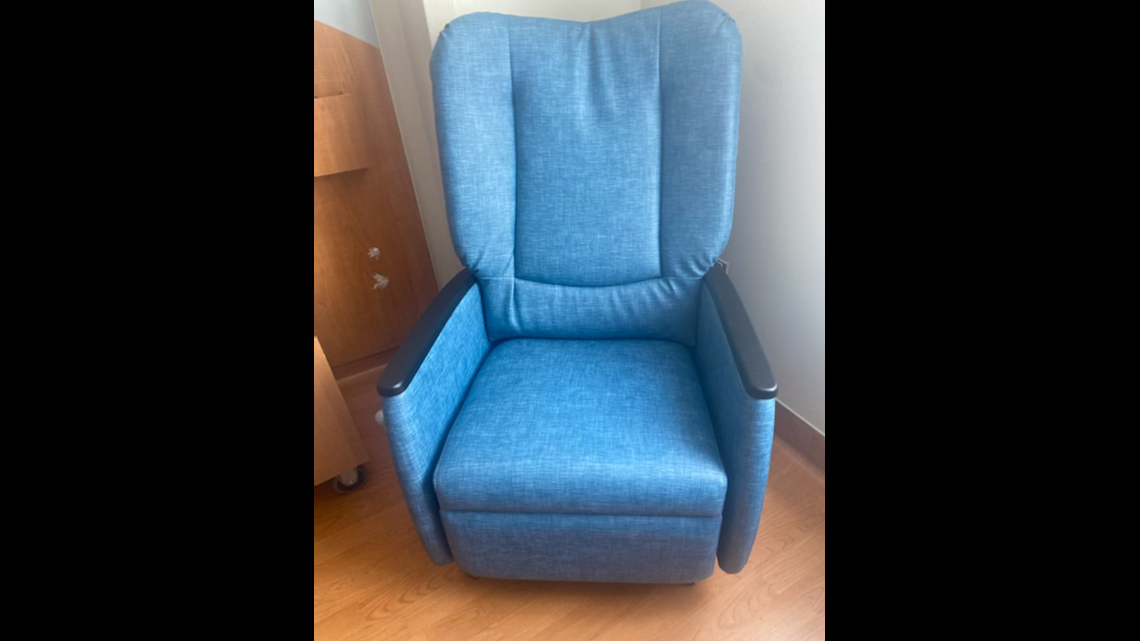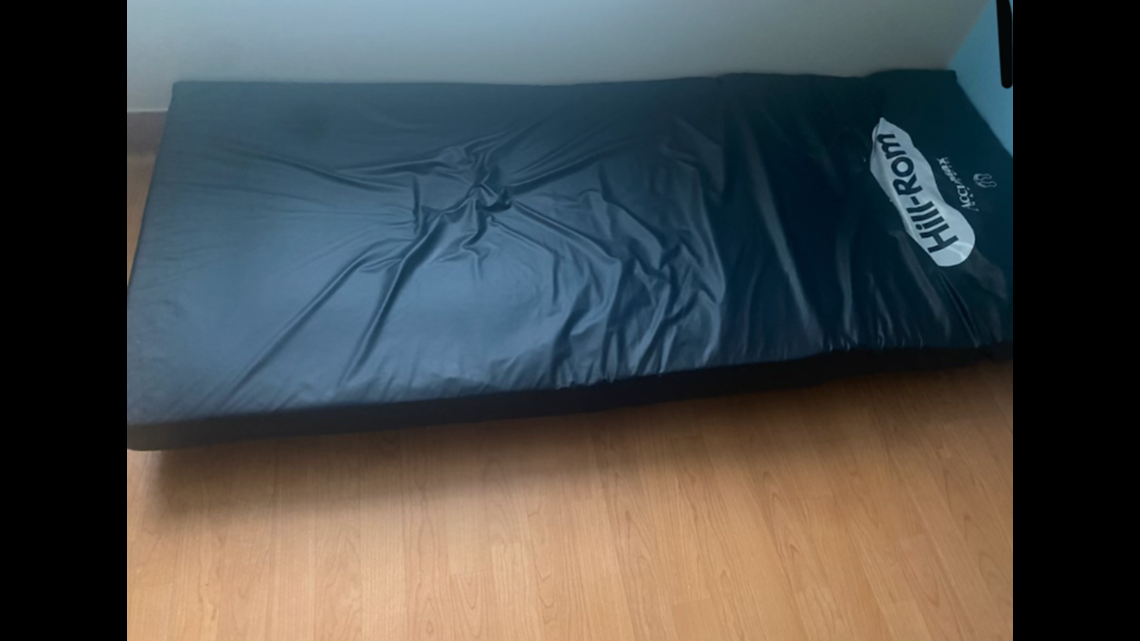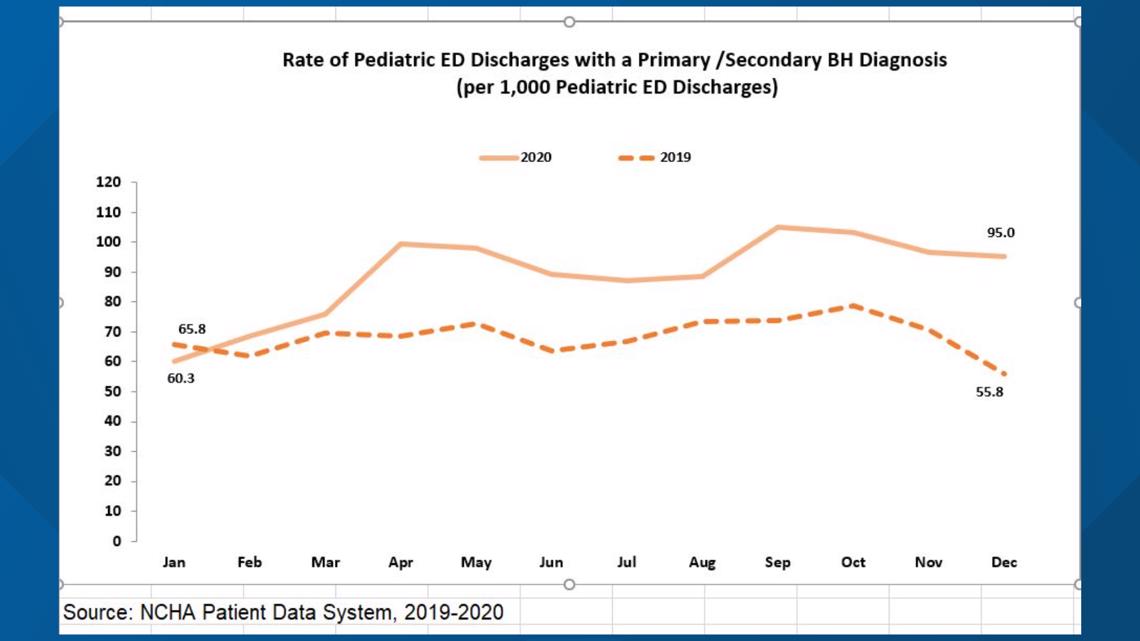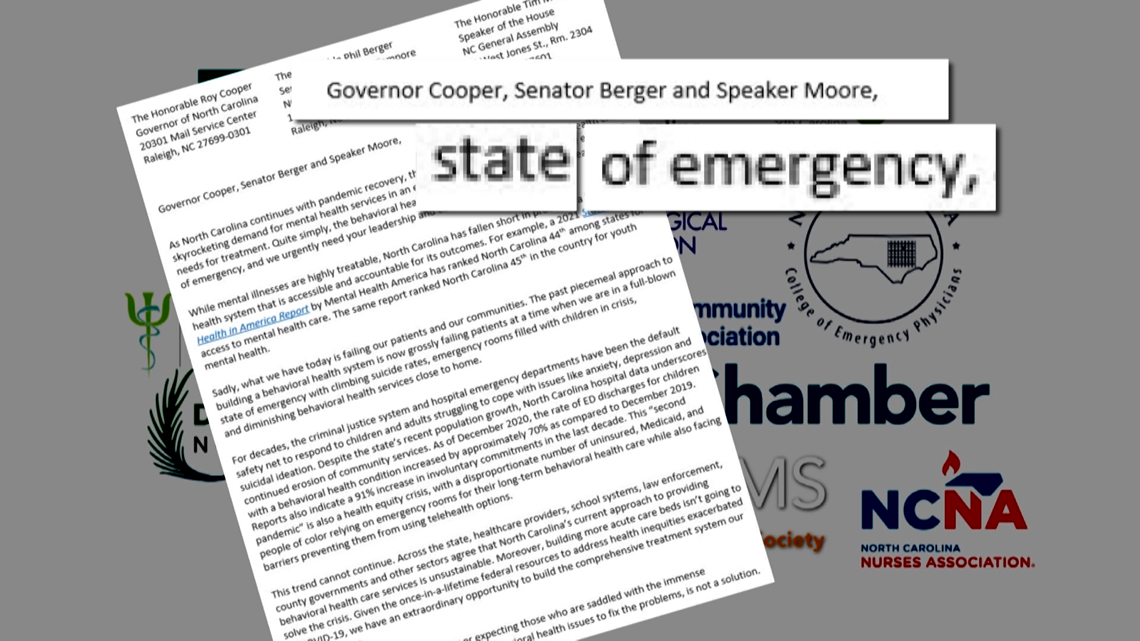CHARLOTTE, N.C. — Atrium Health Behavioral Health Charlotte's pediatric emergency department was so overcrowded at one point in recent months, kids were forced to sleep in chairs in hallways and on mattresses on floors, according to a former patient.
Advocates say the overcrowding there and inside other North Carolina hospitals is a symptom of an overwhelmed mental health system that is failing children who desperately need help. In a letter to state lawmakers, a dozen organizations described the current situation as a "full-blown state of emergency" and urged leaders to come up with bipartisan solutions, especially with "once-in-a-lifetime federal resources" available.
A 17-year-old Charlotte boy said during the more than two weeks he spent at Behavioral Health Charlotte in April, the 22-bed facility didn't have a bed for him.
"I witnessed an overcrowding of kids," he said. "During that time, I slept in a chair in a hallway. I witnessed kids sleeping on mattresses on the floor, some of them in the bathroom."


WCNC Charlotte chose to protect his identity due to his age, the fact he's in temporary state custody, and his mental health condition. That is why he is not being named publicly in this story.
"I have ADHD and PTSD," the teen said.
WCNC Charlotte discussed our sensitivity to his situation at length with him and his grandmother. Both acknowledged the importance of sharing his story.
"The reason I'm here today is not really for myself," he said. "It's for other kids."


Ideally, he said the state would've quickly moved him to a transitional living facility. Instead, he said he waited at length for placement at Behavioral Health Charlotte.
"I didn't meet criteria (for admission), but that's where I remained for 17 days," he said. "It felt very disturbing to me."
From there, he spent time at Levine Children's Hospital where doctors treated him for a physical health issue. The hospital discharged him Monday and DSS placed him in the custody of his grandmother, he said. The teen provided records that support his time at both facilities and his ongoing supervision by the Division of Social Services.


The teen's situation is not isolated. North Carolina Healthcare Association data show a 70% increase in kids discharged from North Carolina emergency departments diagnosed with mental illness or substance use disorder at the end of 2020. NCHA Senior Policy Development Director Nicholle Karim said those kids often have to wait at length in emergency departments for beds to open up at the state's limited number of community-based behavioral health treatment facilities.
"I've heard countless stories from hospitals of kids who are in EDs for sometimes days, weeks, months, waiting for a bed," Karim said. "Our behavioral health system is significantly strained right now."
Karim said the pandemic, with its isolation, remote learning and economic impacts, has increased the demand for children's behavioral services and continues to overwhelm an already burdened system.
"We are really concerned about this trend and this trend simply cannot continue," she said. "It is not sustainable."


A dozen organizations, including the NCHA, sent a letter to the governor and other state leaders earlier this month, outlining the "full-blown state of emergency with climbing suicide rates, emergency rooms filled with children in crisis, and diminishing behavioral health services close to home." The letter called for bipartisan solutions, especially given "the once-in-a-lifetime federal resources."
Records show the governor has proposed $96 million from the American Rescue Plan to improve mental health, but only $1.7 million of that is specifically earmarked for youth services. Meanwhile, NCHA said the Senate's proposed state budget fails "to address critical needs at a time when resources are abundant."
A spokesperson for Sen. Phil Berger said he's open to meeting with the organizations, but defended the Senate's proposed budget.
"The Senate passed its budget proposal last week that contains millions of dollars for mental health services, including $64 million in federal block grants and $15 million from federal COVID-19 relief funding to establish a grant program for school health support services," Communications Advisor Lauren Horsch said in an email. "That’s in addition to funding a school psychologist in every school district in the state. The Senate budget also funds a behavioral health urgent care pilot program in Onslow County to help individuals experiencing a mental health crisis get the immediate care they need while also ensuring continuity of care for anyone who might need longer-term support."
WCNC Charlotte is always asking "where's the money?" If you need help, reach out to the Defenders team by emailing money@wcnc.com.
Speaker Tim Moore's office did not respond to WCNC Charlotte's multiple requests for comment.
Gov. Roy Cooper, meanwhile, responded to advocates' call to action in a letter of his own earlier this week. In that letter, he also criticized the Senate's budget.
"I agree that this is a crisis our state must address with the most important step being to expand Medicaid now..." the governor's June 24 letter said in part. "...My administration is committed to doing everything we can with limited resources to prioritize mental health in healthcare delivery...This week, the North Carolina Senate released a budget that prioritizes tax cuts over the behavioral healthcare needs of North Carolinians and refused once again to expand Medicaid. We can do so much better and your strong voices on this in the legislature are so important."
The governor said he's also asked Department of Health and Human Services Secretary Mandy Cohen and Deputy Secretary Kody Kinsley to arrange a meeting with the organizations "to discuss how we can partner to ensure all North Carolinians can access critical mental health services."
DHHS told WCNC Charlotte the agency has also "prioritized" addressing behavioral health needs during the pandemic, creating the free HOPE4NC Helpline (1-855-587-3463) to provide immediate assistance to people experiencing mental health and substance abuse challenges or who are in crisis, increasing access to publicly funded behavioral health services (including telehealth flexibility) and worked to decrease the overutilization of hospital emergency departments by supporting peer-run wellness centers for people experiencing mental health crises. In addition, the agency said the state has continued to increase capacity for evidence-based care coordination to help "ensure that children, adolescents and adults with complex behavioral health needs receive appropriate treatment and recovery supports in the community."
"North Carolina recognizes the need to provide services to adolescents and children who also experience mental health crises and we are pleased that three new Child and Adolescent Facility Based Crisis (FBC) centers will open by September 2021," DHHS Press Assistant Catie Armstrong said.
The most recent State Medical Facilities Plan identifies 386 psychiatric in-patient child/adolescent beds in North Carolina, excluding state hospitals.
Back in Charlotte, the former Behavioral Health Charlotte patient said a top Atrium Health manager reached out to him about his experience at the emergency department in April.
"She called me and she stated that she was sorry about what happened and that they're aware of the situation," he said.
Atrium Health wouldn't talk specifics with WCNC Charlotte, but didn't deny his allegations. Instead, the health system offered this explanation:
"Like so many other health providers across the state, overcrowding can be a problem at our behavioral health facilities at times," Atrium Health Clinical Communications Senior Specialist Jerrika Swartz said in an email. "Law enforcement and emergency departments have become the safety net where social service providers and agencies just drop off patients without regard for available resources or diagnosis. Regardless of the circumstance, we continue to do all we can to ensure that each patient who comes through our doors receives appropriate care and the best possible outcome for their individual situation. We maintain a deep commitment to our behavioral health programs, investing more than $79 million per year into treating some of the most vulnerable members of our population."
DHHS reports the agency hasn't received any complaints about Behavioral Health Charlotte in 2021.
This story started with a tip. If you know of something that needs investigating, email Nate Morabito at nmorabito@wcnc.com.

